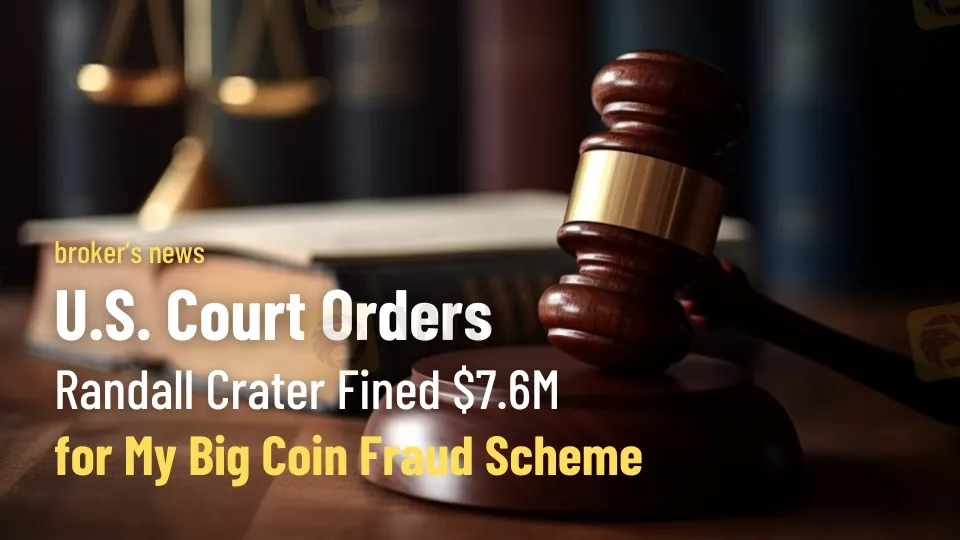U.S. Court Orders Randall Crater Fined $7.6M for My Big Coin Fraud Scheme
Abstract:Randall Crater was fined $7.6M for My Big Coin fraud, banned from trading, and sentenced to prison in a landmark CFTC enforcement action.

The United States Commodity Futures Trading Commission (CFTC) has obtained a consent order against Randall Crater of Heathrow, Florida, for his role in a fraudulent digital asset scam. The United States District Court for the District of Massachusetts ordered Crater to pay over $7.6 million in reparations to people cheated by his My Big Coin (MBC) scam.
The settlement decree, which addresses the CFTC's allegations against Crater, also includes a permanent injunction prohibiting him from trading in CFTC-regulated markets, transacting with digital asset commodities, or registering with the CFTC. This ruling followed a concurrent criminal case in which Crater was sentenced to more than eight years in jail and had to pay $7.6 million in restitution and forfeiture.
From January 2014 to January 2018, Crater and his co-defendants ran a fraudulent enterprise that marketed My Big Coin as a fully working virtual currency backed by gold. Crater misled at least 28 consumers by making false statements regarding the value, trading status, and usability of MBC, stealing more than $7.6 million. He used the money to buy luxury things including a house, antiques, fine art, and jewelry.
The CFTC's action against Crater's co-defendants—Mark Gillespie, My Big Coin Pay, Inc., My Big Coin, Inc., John Roche, and Michael Kruger—is still pending. The CFTC has warned that, while restitution orders are intended to recoup lost monies, plaintiffs may not always get full compensation due to insufficient assets retained by wrongdoers.
This lawsuit demonstrates the CFTC's commitment to combatting digital asset theft and protecting consumers. Crater's conviction and punishment in the related criminal case emphasize the gravity of his acts. On July 21, 2022, he was convicted of wire fraud, illegal monetary transactions, and running an unregistered money-transmitting company.
The CFTC continues to prioritize prosecuting fraudsters responsible and ensuring the integrity of digital asset markets. Victims of such scams are advised to report suspicious activity to the CFTC to help with continuing enforcement operations.
This example serves as a clear reminder of the hazards connected with digital asset investments, as well as the significance of doing due diligence. As the CFTC steps up its assault on fraudulent schemes, it hopes to create a safer and more transparent market for all participants.

Read more

Lost Money to Scam Recently?! This Article Could Help You!
The rise of online trading has brought unparalleled opportunities for investors worldwide. However, alongside legitimate platforms, fraudulent brokers continue to exploit unsuspecting individuals, luring them with promises of high returns and exclusive investment opportunities. For those who have fallen victim to such schemes, the pressing concern remains: is there a path to recovering lost funds?

SEC Ends Crypto.com Probe, No Action Taken by Regulator
The SEC has closed its investigation into Crypto.com with no action taken. Crypto.com celebrates regulatory clarity and renewed momentum for the crypto industry.

Interactive Brokers Expands Crypto Trading with Solana, XRP, Cardano, and Dogecoin
Interactive Brokers adds Solana, XRP, Cardano, and Dogecoin to its platform, enabling U.S. and U.K. clients to trade crypto 24/7 with low fees.

Fidelity Investments Explores Stablecoin Innovation in Digital Assets Sector
Fidelity Investments tests a stablecoin, joining major financial firms in the booming crypto sector. Discover how this impacts digital payments and blockchain adoption.
WikiFX Broker
Latest News
Why Are Financial Firms Adopting Stablecoins to Enhance Services and Stability?
Experienced Forex Traders Usually Do This Before Making a Lot of Money
Octa vs XM:Face-Off: A Detailed Comparison
When High Returns Go Wrong: How a Finance Manager Lost RM364,000
Bridging Trust, Exploring Best—WikiEXPO Hong Kong 2025 Wraps Up Spectacularly
Interactive Brokers Expands Crypto Trading with Solana, XRP, Cardano, and Dogecoin
Fidelity Investments Explores Stablecoin Innovation in Digital Assets Sector
Why More People Are Trading Online Today?
SEC Ends Crypto.com Probe, No Action Taken by Regulator
Broker Comparison: FXTM vs XM
Rate Calc

